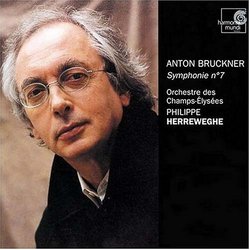| All Artists: Anton Bruckner, Philippe Herreweghe, Champs Elysees Orchestra Title: Bruckner: Symphony No. 7 / Herreweghe Members Wishing: 0 Total Copies: 0 Label: Harmonia Mundi Fr. Release Date: 11/9/2004 Album Type: Import Genre: Classical Style: Symphonies Number of Discs: 1 SwapaCD Credits: 1 UPC: 794881751921 |
Search - Anton Bruckner, Philippe Herreweghe, Champs Elysees Orchestra :: Bruckner: Symphony No. 7 / Herreweghe
 | Anton Bruckner, Philippe Herreweghe, Champs Elysees Orchestra Bruckner: Symphony No. 7 / Herreweghe Genre: Classical
|
Larger Image |
CD Details |
CD ReviewsSurprise, Surprise: A historically correct Winner! J. F. Laurson | Washington, DC United States | 11/21/2004 (4 out of 5 stars) "Oh Boy! "Historically Informed Bruckner" - just what we needed, right? Seriously: after Roger Norrington suggesting to play Mahler without vibrato (historically correct as that may be), this seemed to be just about the next-dumbest idea. But unlike the recent and highly unnecessary Bruckner recordings of Messrs. Eschenbach and Nagano, this is actually rather a delight. Smaller forces, original instruments (gut strings and all) make for a very clean, crisp sound. Clocking in at exactly an hour, this 7th - sans cymbal crash in the Adagio - has a sheen that puts it above many conventional rivals that pander too much to the clichés of Bruckner-performance. Among modern versions it stands up to Rattle and Harnoncourt - and while I reserve a special place in my heart for G. Wand's and E. Jochum's recordings, this live performance is good enough even to make a first choice." Bruckner Lite-OK Live Recording Timothy Dougal | Madison, Wi United States | 03/18/2005 (3 out of 5 stars) "This is the first Bruckner I've heard on period instruments, but the result is more cuious than convincing. The outer movements lack urgnecy or mystery in Herreweghe's hands, and instead come off rather bouncy, a word which I would not have thought could be applied to Bruckner. The Adagia is solemn but lacking in passion. The Scherzo is pretty good. The recording job is OK. It's a stealth 'live' job, since nowhere on the box or notes does it acutally say so, but on headphone the audiance presence is clear." Early Music Bruckner V. Wilson | Cambridge, MA United States | 08/23/2006 (3 out of 5 stars) "Herreweghe is well-known for his recordings of early music and his advocacy of historical instruments and performance practices. Here, he brings that approach to Bruckner with decidedly mixed results. Ultimately, though, I think the problems lie with Herreweghe himself and not his "reduced" orchestra.
After a short adjustment period, I really took to Herreweghe's idea of an orchestra with a reduced string section playing on gut strings. Without the overwhelming string textures of most modern orchestras one can really hear the wind instruments. Not only does this mean one can hear all their interesting contrapuntal lines, but one can also hear when Bruckner adds them to the string textures to change the color a little. Herreweghe's use of historic instruments (and modern replicas) really pays benefits with the brass which are far more nimble than most modern orchestras. One loses some oomph, of course, but in Bruckner's many loud dotted passages for the brass one actually hears music as opposed to the galumphing that modern, overly resonant instruments produce. The real problem with this recording is Herreweghe's inflexibility with tempo and complete unwillingness to indulge in even the slightest rubato. The tempos are generally quicker than one usually hears in this music, but that isn't by itself a flaw. One of my favorite recordings of this piece is William Steinberg's old recording with the Pittsburgh Symphony that clocks in at nearly the same 60 minutes Herreweghe takes. The difference is that Steinberg knows when to push ahead and when to relax and indulge a phrase. Herreweghe pretty much bulls ahead without any patience for what a little phrasing might do. This may be the style of modern early instrument performances, but Bruckner wrote romantic music no matter how austere his musical ethos was. Herreweghe's style might work better with Bruckner's 5th symphony, but the 7th calls for some appreciation of the beauty of the music. Overall, I suspect Herreweghe's way with Bruckner might improve as he spends more time with the composer. As a result, I look forward to listening to other Bruckner from him. With this recording, though, proceed with caution." |

 Track Listings (4) - Disc #1
Track Listings (4) - Disc #1